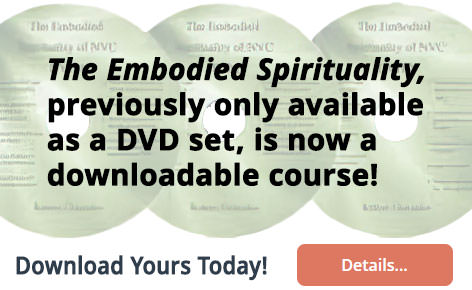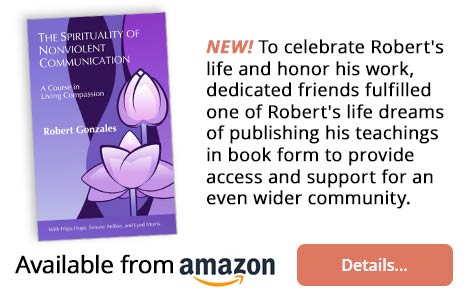

Welcome to the Robert Gonzales Training Legacy. Here you can learn more about Robert and the powerful teachings he dedicated his life to. NVC Academy is proud to house and share with you the complete body of his life's work. We invite you to explore, learn, and help keep his legacy alive!
Robert's passion was in the spirituality of the Nonviolent Communication (NVC) process. He saw NVC both as a process that helps people connect more authentically with themselves and others, and as a spiritual practice and way of living. The worldwide NVC community mourned when Robert died in 2021. He left behind a legacy of work that emerged from a lifetime of inquiry into the intersection between spirituality and human communication. More about Robert.
Article
4-6 minutes
This anecdote illustrates how a young man had the social awareness to consider how male conditioning may bring up competitiveness in his interactions with another man. The young man offered transparency and checked for consent in a way that shows an embodiment of power-with, togetherness, consideration, care, collaboration... and all without displaying any formal NVC training, and without looking to impress.
Details...Article
3-5 minutes
Among NVC practitioners, empathy can be superficial. How open are you to being influenced by what others are saying? Do you reflect back and then guard and remain within your position of being right, even as you say otherwise? Only when we're eager to be influenced by what they say can we connect, expand our world and thus, shift the field. Without such openness we fool ourselves into thinking we are truly empathic listeners.
Details...Trainer Tip
1-2 minutes
Trainer Tip: Empathy is a process in which we acknowledge and understand others' experience without judging or bringing up our own life experience. It can defuse a violent situation and anger in seconds, plus provide a clarity that catapults someone to a deeper level of understanding. The process is simple; listen for their feelings and needs. It can be healing for them to be deeply understood.
Details...Article
7-12 minutes
Total inclusion is impossible: inclusion of all can often lead to exclusion of those who can't bear the behaviors of some. Many groups flounder and disintegrate because of too much inclusion. Limited resources and capacities may make it necessary to exclude. Keeping more coherent shared values and strategies may be another reason to place membership conditions so that what appears to be exclusion may give movements a chance to expand.
Details...Practice Exercise
4-6 minutes
You may want to shift power dynamics in intimate and family relationships -- especially if there's longstanding, unprocessed hurts. Reflect on where, when and with whom you tend to enter reactive “power over” patterns. Explore the feelings and needs that are up for you in those contexts. Imagine other ways that could meet your needs in, or before, those moments. In this way, in similar situations you can have more access to choice.
Details...Video
7 minutes
Have you ever used the phrase "it was just a miscommunication."? We're often good at identifying when communication breaks down but not so good at finding out what went wrong and how we can improve. In this NVC Life Hack, we take a look at different types of communication requests and how they play out in a role play.
Details...Trainer Tip
1-2 minutes
Trainer Tip: It's important to design requests to fit specific needs. Otherwise people may do exactly what you ask and still, your needs may not get met. Before you make a request of someone, notice if the strategy you are considering is likely to meet your needs. If not, consider making a different request that may be more satisfying to you.
Details...Article
6-9 minutes
Much like other asymmetric relationships (such as therapist and client), there are complications related to power dynamics that can arise with any NVC trainer having sex with a participant. For one, there's (counter)transference. And there's potential for things that may not move outside this asymmetric relationship -- such as projections where the participant, and/or the trainer, is guided by un-healed pain of their "inner child".
Details...Learning Tool
1-2 minutes
In Nonviolent Communication "power over" refers to the use of power to dominate or control others. It is a form of violence or force, whether physical, emotional, psychological or otherwise. This learning tool has six lists, each containing different types of power over strategies: physical, sexual, intimidation, economic, emotional, isolation.
Details...Practice Exercise
4 - 6 minutes
Blame is a misguided habit that's used to avoid pain and suffering, offering only a momentary distraction and oversimplifies complex histories. It also disconnects us from choice and agency, blocks us from discovering more about ourselves and others, and can keep us from having compassionate, self responsible conversations. Instead, we can practice speaking in terms of impact and notice our experience without trying to escape it.
Details...

